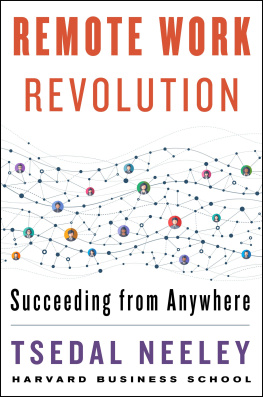THE LANGUAGE OF GLOBAL SUCCESS
The Language of Global Success
How a Common Tongue Transforms Multinational Organizations
Tsedal Neeley
PRINCETON UNIVERSITY PRESS
PRINCETON AND OXFORD
Copyright 2017 by Princeton University Press
Published by Princeton University Press,
41 William Street, Princeton, New Jersey 08540
In the United Kingdom: Princeton University Press,
6 Oxford Street, Woodstock, Oxfordshire OX20 1TR
press.princeton.edu
All Rights Reserved
ISBN 978-0-691-17537-9
Library of Congress Control Number 2017944328
British Library Cataloging-in-Publication Data is available
This book has been composed in Adobe Text and Gotham
Printed on acid-free paper.
Printed in the United States of America
10 9 8 7 6 5 4 3 2 1
To my parents, my first inspiring global teachers
CONTENTS
THE LANGUAGE OF GLOBAL SUCCESS
Introduction
If as one people speaking the same language they have begun to do this, then nothing they plan to do will be impossible for them. Come, let us go down and confuse their language so they will not understand each other. So the Lord scattered them from there over all the earth, and they stopped building the city.
THE TOWER OF BABEL (GENESIS 11:19)
They saw what seemed to be tongues of fire that separated and came to rest on each of them. A crowd came together in bewilderment, because each one heard their own language being spoken. Utterly amazed, they asked: Arent all these who are speaking Galileans? Then how is it that each of us hears them in our native language?
THE HOLY SPIRIT COMES AT PENTECOST (ACTS 2:111)
Two well-known stories from the ancients showcase the fundamental role that language plays in human interaction and demonstrate its power to be a prelude to chaos or a herald of new understanding. The story of the tower of Babel testifies to the inevitable scattering that follows linguistic confusion. When communication breaks down, no one can move forward; they are unable to understand or be understood. Big plans come to nothing. In contrast, the story of the Pentecost demonstrates how, despite differences in native language, it is possible for each person in the crowd to understand perfectly what is being said. Although they originate in different cultures and locations, the people are no longer separated from one another; they are joined in clarity.
Today, language holds a similar weight in global organizations as it did for the confused people in the story of Babel and the amazed onlookers in the story of the Pentecost. There is urgency for global employees to communicate effectively so that all can engage and participate in the work required, and indeed, global organizations are at the frontier of changes in language use. For over three decades, American and British political, economic, and technological power on the worlds stage has propelled English as the lingua franca (common language) of international business. Approximately 52 percent of multinationals today use English for some capacity of cross-border work. Yet despite the clearly established link between language and societal macro-forces, there is a surprising absence of research into how shifts in language and culture play out longitudinally at the organizational level. Adopting a lingua franca, which by definition is foreign to a portion of the employees, is not only a matter of mastering vocabulary lists and grammatical tenses. Nor is it simply a matter of having to learn the particular culture that any given language is said to embody; learning French certainly doesnt bestow knowledge of fine cheeses, nor does learning Farsi carry a proclivity for knotting intricate carpets.
I have studied the lingua franca phenomenon in global organizations for nearly fifteen years. The seed of my interest was first planted when I was part of a study at Stanford University examining the cross-cultural experience of globally dispersed teams at a German high-tech company. As many as 70 percent of employees we interviewed in Germany, India, and the United States attributed collaboration hardships of one sort or another to language. One of my first interviewees teared up when describing an ongoing sense of ostracism as a result of other team members habitual switch to a foreign language. Others described difficulty speaking the dominant language as the source of isolation in their teams and their organizations. Many saw language differences as the most divisive aspect of their global teamwork.
As soon as I left those interviews, I turned to the literature to make sense of what I had heard. I was surprised to find very little existing research that could explain the emotionally charged experiences that employees had recounted, and even more surprised that such a knowledge gap existed about one of the most fundamental means for global workers to communicate. Since that first study, I have been motivated to go as deep and wide as I could to systematically study and write about language and the role it plays in global work.
The story of how language can affect employees and organizations in the course of a lingua franca adoption, and consequently, how our previously held notions of language and culture become upended, especially in one e-commerce high-tech giantRakutenis the subject of this book. Rakuten is a leader in Japans e-commerce space, and its CEO is regarded as a maverick in business and cultural change, but its challenges with language and cultural diversity are germane to many global organizations.
Founded in June 1997 in Japan as an e-mall service, Rakuten Ichiba was part of the mid-1990s Internet growth that ushered in an era in which the buying and selling of products and services moved online in what has become the e-commerce industry. Although in the past two decades traditional brick-and-mortar retail businesses have increasingly adopted online shopping capabilities or participated in third-party online marketplaces, Rakuten has been strictly an e-commerce business from its founding. Approximately 75 percent of growth in retail sales since 2000 can be attributed to e-commerce.
In March 2010 the CEO of Rakuten, Hiroshi Mikitani, mandated a company-wide English language initiative, effective immediately. I learned about Englishnization at Rakuten several months later and began to interview employees and conduct what would become a five-year, in-depth, longitudinal study of Rakutens English language strategy. Throughout the study, Mikitani granted me total access to his company, inviting me to go anywhere in the world to talk to any of his employees and without imposing a single condition. I talked with people as many times as I deemed necessary to develop a rich understanding of lingua franca and cultural phenomena as they unfolded in real time. I employed a hybrid approach to collect qualitative, quantitative, and archival data. The qualitative data comprised 650 interviews across eight country sitesBrazil, France, Germany, Indonesia, Japan (headquarters), Taiwan, Thailand, and the United Statesthat were conducted in five languages. The quantitative data were collected at two points in time, totaling 3,056 surveys. I also collected over 20,000 pages of archival documents. The data I collected eventually informed the findings that I present as Phase One and Phase Two, capturing two key stages of the lingua franca adoption processes. Further details about my research methods can be found in appendices A and B, where I delineate how I analyzed the quantitative data.












